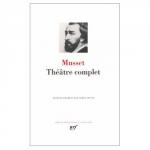|
This section contains 3,293 words (approx. 11 pages at 300 words per page) |

|
SOURCE: King, Russell S. “Linguistic and Stylistic Clues to Characterization in Musset's Fantasio.” Neophilologus 58, no. 2 (April 1974): 187-94.
In the following essay, King concentrates on Musset's depiction of the title figure in his drama Fantasio as a faithless young man, examining this character's extensive use of exclamation, rhetorical questioning, conditional phrases, and similar ironic or manipulative forms of speech.
The playwright does not enjoy the novelist's more obvious advantages in portraying and analysing characters, for the benefits obtained from a multiplicity of modes of narration are largely closed to him. The playwright, unlike the third person narrator in the novel, is unable to pause to describe and analyse the emotions of a character; and, in most drama, the soliloquy is used more sparingly than interior monologue or free indirect speech, at least in modern writings. Character indications—age, temperament, etc.—in the dramatis personae or at the beginning of...
|
This section contains 3,293 words (approx. 11 pages at 300 words per page) |

|


